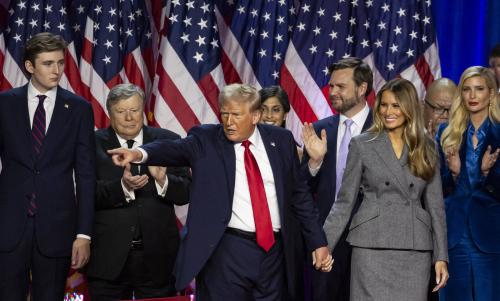

7:30 pm CDT - 8:45 pm CDT
Past Event
Twenty years after the Orange Revolution, 10 years after Euromaidan and Russia’s seizure of Crimea, and two-and-a-half years after Russia’s full-scale invasion, Ukraine continues to fight for its independence against its much larger and nuclear-armed neighbor. The next U.S. administration and Congress will confront a continuing war in Europe along with pressing challenges from China to the Middle East and Mexico. How should the next administration adjust U.S. policy toward Ukraine, attempt to bring the Russia-Ukraine war to an end, and resolve the question of NATO membership for Kyiv? How can it best work with its NATO allies and others to handle the challenge of a revisionist Russia and ensure European and American security? How should the United States and Europe aid in rebuilding Ukraine?
On Thursday, September 12, the Brookings Foreign Policy program, in partnership with the World Affairs Council of Dallas/Fort Worth and DBU’s Institute for Global Engagement, hosted a panel discussion with Brookings Senior Fellows Fiona Hill and Constanze Stelzenmüller as well as George W. Bush Institute Executive Director David J. Kramer to consider how the United States will manage its policies toward and relationships with Europe, Ukraine, and Russia going forward. Audience Q&A followed the discussion.
Viewers submitted questions via email to [email protected] and via X (Twitter) to @BrookingsFP using #Ukraine.
This event is a part of Brookings’ Election ’24: Issues at Stake, an initiative aimed to bring public attention to consequential policy issues confronting voters and policymakers in the run up to the 2024 election. This includes equipping leaders with insights and policy ideas to help them govern in 2025 and beyond.
In Partnership With


John Villasenor, Joshua Turner
November 14, 2024

Pavel K. Baev, Vanda Felbab-Brown, Jeffrey Feltman, James Goldgeier, Samantha Gross, Ryan Hass, Mara Karlin, Patricia M. Kim, Lynn Kuok, Tanvi Madan, Suzanne Maloney, Alexander Noyes, Sophie Rutenbar, Natan Sachs, Mireya Solís, Constanze Stelzenmüller, Shibley Telhami, Valerie Wirtschafter, Andrew Yeo
November 14, 2024

Richard C. Bush
November 8, 2024